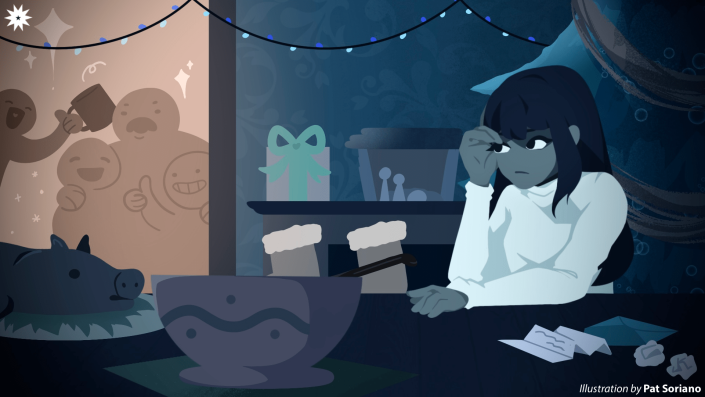Festive celebrations made their ends months ago, and it was truly a time marked by the joy of gift-giving, harmonious caroling, and expressions of gratitude for the memorable moments shared with family and friends. But behind these merry moments is the truth that there are those who find themselves sitting alone on Christmas Eve, taking on a season of joy with a difficult headspace.
This is the reality of Christmas: to some, it inspires feelings of warmth, joy, and belonging; but to others, the season can bring loneliness, stress, and anxiety. This phenomenon is called the holiday blues.
Painting the blues
Dr. Ron Resurreccion, associate dean of the College of Liberal Arts and a registered psychologist, describes the holiday blues as the onset of depressive symptoms associated with the holiday seasons. These symptoms include “low energy, lack of interest, change in appetite and sleep patterns, and difficulty in concentration.” With its varying intensities and durations, it manifests differently in everyone.
The holiday blues is often mistaken for Seasonal Affective Disorder (SAD) as they are both characterized by drastic mood changes. However, they have some key differences. SAD is a form of depression that results from environmental factors such as light exposure. According to Resurreccion, reduced levels of sunlight may disrupt the body’s internal clock or circadian rhythm, increasing the risk of developing depression.
The holiday blues, on the other hand, cannot be classified as a mental illness due to its short-term nature, being only a temporary feeling triggered by social obligations and financial strains. It can also be tied to a specific event, unlike the cyclical nature of SAD that comes with the constant changing of seasons throughout the year.

The coldest night of the year
While the effects of the holiday blues vary across individuals, they are generally caused by stressors—events or scenarios that create stress. Common stressors during the holidays may encompass social relationships and interactions, finance, and the weather.
Social gatherings are indispensable to holiday festivities because they provide individuals with a sense of security and intimacy. However, complex family relationships due to age differences, marital histories, and obligations may disrupt the well-intended purpose of these gatherings. As a result, tensions or feelings of unease may arise between family members, influencing individual well-being. Alongside the stress that comes with managing relationships, some people may also experience “FoMO” or the fear of missing out, which generates feelings of loneliness or anxiety.
The season of giving is also a time of spending. On average, Filipinos spend P37,106—which accounts for 331 percent of their monthly income—during the season. In a time where many struggle to stay afloat financially, Christmas traditions may pressure individuals to spend unwillingly, leading to financial stress. In fact, two in five adults are worried about affording and finding presents, in addition to working longer hours.
Moreover, weather plays a role in influencing a person’s emotional state. Research shows that people tend to assign negative emotions to the word “cold” such as unhappiness, dissatisfaction, and indifference. Heron* (II, HUM-BIO) even characterized their blues with “[a] lack of interest, [with] nothing to look forward to (during the holidays).” In contrast, exposure to sunlight could enhance mental health conditions.
“During the cold season, the amount of sunlight is reduced; our body clock changes, and neurotransmitters, such as serotonin, drop. This affects our mood,” Resurreccion elaborates.
Arrysola* (I, BSCS-ST) expresses their experience with the holiday blues, stating that amid the joy and celebrations associated with the holidays, they find this time to be particularly difficult. In an environment full of caroling children and family gatherings, they share that they would rather be isolated because of how stress-inducing it is. “Sometimes, holidays are so stressful on their own that I just devolve into a depressive state,” they remarked.
Make the Yuletide gay
Recognizing the inherent challenges that the holidays pose for many is a crucial step to advocating for open conversation and empathy. Issues like the holiday blues and SAD highlight the importance of establishing an environment that prioritizes people’s mental health.
With that in mind, there are various methods to manage the holiday blues. For people like Arrysola, coping strategies that involve staying active, such as taking walks and indulging in their hobbies, can beat the blues. They also encourage avoiding situations that would worsen their depressive feelings. Similarly, exposure to sunlight, nature, and new environments can curb one’s stress and anxiety. However, when the holiday blues seem too overwhelming, do not hesitate to seek professional help from mental health professionals like counselors and psychiatrists.
Support is crucial in dispelling misconceptions and societal taboos linked to seeking assistance. Each holiday season, people should strive to exchange not only gifts but also empathy. By dismantling these barriers, we pave the way for a more inclusive and supportive atmosphere, allowing everyone to genuinely savor the warmth and joy that the holiday season brings.
*Names with asterisks (*) are pseudonyms.
For mental health concerns, students may reach out to the DLSU Office of Counseling and Career Services through their official Facebook page of the same name or their email at [email protected].
